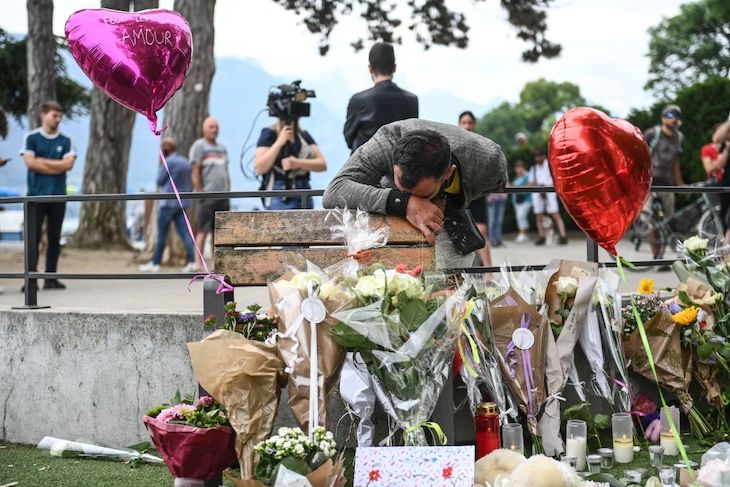The Green mayor of Annecy, François Astorg, declared a fortnight ago that his town in the south-east of France was ‘a land of resistance against fascism, a land of solidarity, a refugee town for those fleeing war, misery and the unhappiness in the world’.
On Thursday, Astorg, expressed his ‘immense sadness’ and his ‘anger’ hours after a Syrian refugee ran amok in a park in Annecy, stabbing six people including four toddlers. ‘It’s the first time this has happened in Annecy,’ declared Astorg. ‘It’s unacceptable’.
The mayor has said that there will be a rally to bring the town together; the cynic is entitled to ask ‘what is the point?’ No doubt well-meaning people will light candles and leave cuddly toys, and perhaps some will break into song: ‘Imagine’ or ‘Don’t Look Back in Anger’. But what good will this music do?
Astorg tweeted his support for refugees and migrants last month after a right-wing march through his town; immigration has been a running sore in this spot of France ever since the migrant crisis of 2015 brought more than a million people into Europe. The following year, Marine Le Pen’s National Rally (then the National Front) staged a demo to protest against the relocation of migrants in Annecy from Calais. They were met by a counter demo of ‘anti-fascists’.
The mayor of Annecy’s compassion and kindness were betrayed by the Syrian refugee
There may have been a few far-right extremists among the protestors in Annecy last month. But anyone who expresses opposition to mass immigration risks being called a ‘fascist’ by activists.
A similar tactic is used in Britain, as Home Secretary Suella Braverman discovered earlier this year after she expressed her determination to restore order to borderless Britain. An elderly Holocaust survivor accused her of using ‘dehumanising’ language, and the television personality Gary Lineker said that Braverman’s rhetoric was like something out of 1930s Germany.
Lineker was subsequently honoured by Amnesty International with a ‘Sports and Human Rights’ award. Collecting his accolade at a ceremony in Rome, the former footballer said people should show ‘more compassion, empathy and kindness’ towards refugees.
The mayor of Annecy’s compassion and kindness were betrayed by the Syrian refugee, but he is not the first. In 2015, a teenage Iraqi arrived illegally in Britain and was placed in foster care where he was showered with love and support. Two years later, Ahmed Hassan detonated a bomb on a London tube train; only his ineptitude in manufacturing the explosive device prevented any fatalities.
That same year, in Liverpool, a Christian couple took in Emad Al Swealmeen, a Syrian refugee, or so he claimed. In fact, Al Swealmeen was an Iraqi and, in 2021, he was killed attempting to blow up a maternity hospital in the city where he had been given sanctuary.
For too long, activists have been allowed to dominate the divisive debate on immigration; they have done so by storming the moral high ground and then bombarding adversaries with spurious accusations of ‘fascism’, ‘racism’ or ‘Islamophobia’. At the same time, they signal their virtuousness with trite soundbites about ‘compassion’ and ‘kindness’, and speaking up ‘for those poor souls that have no voice.’
Of course, many of those who come to our shores seeking refuge live peacefully. But some do not, and it’s the poor souls who happen to be in the wrong place at the wrong time who suffer their wrath. Such was the tragic case of 21-year-old Thomas Roberts, from Bournemouth, fatally stabbed by an Afghan asylum seeker who had entered Britain, despite having previously killed two people in Serbia.
In an interview in September 2019, Emmanuel Macron expressed his sympathy for refugees and migrants, but France’s president was adamant that his country ‘cannot take in all the misery of the world’. No European country can, of course, but prime ministers and presidents are up against the powerful force of progressivism: the Pope, for example, who believes Europe has a duty to welcome all migrants and asylum seekers; ditto the Archbishop of Canterbury, Justin Welby, who last month criticised the government’s immigration bill. In a Lord’s speech, Welby said he ‘will not abandon the most vulnerable people that Jesus Christ specifically calls us to love’.
Even King Charles III reportedly described as ‘appalling’ the government’s plan to fly migrants from Britain to Rwanda, where their claims can be processed before a final decision is taken as to whether they are entitled to asylum.
Yet these people don’t speak for everyone: opinion polls repeatedly show that two-thirds of Europeans want tougher border controls, but their will has been consistently ignored this century. These are the people who actually have no voice, not the men and women entering Europe illegally who are championed by the great, the good and the gullible.







Comments